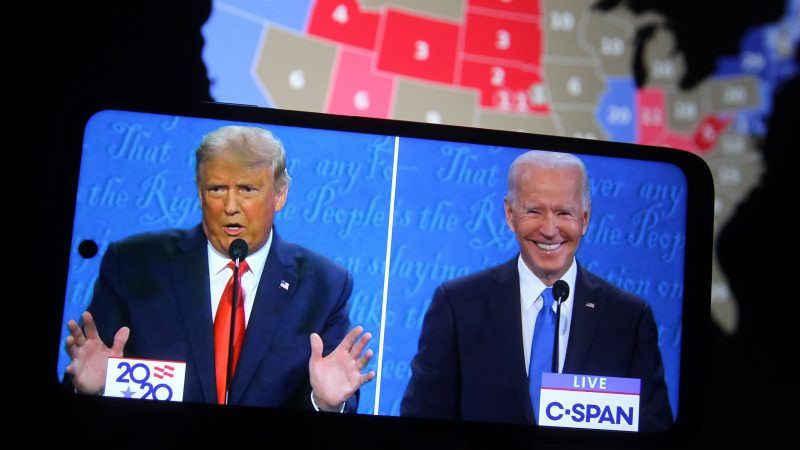Biden Set To Entrench Trumpist Protectionism With 'Buy American' Order
Biden is seeking unity, but bipartisan agreement on bad policy is nothing to cheer for.

President Joe Biden took office with a promise to bridge America's deep political divides—but, in practice, that might look a lot like entrenching some of the mistakes of the Trump administration.
Not all of them, of course. In a flurry of Inauguration Day activity, Biden has already taken steps to undo some of his predecessor's terrible immigration policies and signaled his intention to rejoin some global institutions that Trump disdained. When it comes to trade policy, however, the new president's inclination toward openness and free exchange is less pronounced—and Trumpist protectionism is likely to remain in force, at least in some limited ways.
As part of Biden's "First Ten Days" agenda, the White House is expected to issue an executive order "to strengthen Buy American provisions so the future of America is made in America," according to a memo from Ron Klain, Biden's chief of staff. The specifics of Biden's "Buy American" plan remain sketchy for now, but his campaign promised an overhaul of government procurement rules to require a larger share of federal purchasing comes from domestic suppliers—and to cut the number of waivers granted to allow foreign purchasing.
In touting the plan shortly after the election, Biden promised to go even further. "No government contracts will be given to companies that don't make their products in America," he told The Washington Post.
While it may be politically expedient, that kind of protectionism would force taxpayers to pay higher costs for government projects and would likely mean that fewer projects get funded in the first place. It would disrupt cross-border supply chains that provide much of what American governments need to keep sewer systems running and roads paved.
Indeed, businesses in Canada are already bracing for the Biden administration to double down on the economic nationalism of the Trump years, according to The Canadian Press. And because manufacturing supply chains in North America are deeply integrated, businesses on both sides of the border would be disrupted if the White House prioritizes goods made exclusively in America.
"Canada, Mexico, and the United States don't trade with each other anymore—we build things together," Dennis Darby, president and CEO of Canadian Manufacturers & Exporters, a trade association, said in a statement. "Excluding each other from our respective government procurement markets could seriously hurt our precarious economic recovery."
Darby's right that it makes little sense to view the United States, Canada, and Mexico through a nationalist lens—indeed, even the generally protectionist Trump administration admitted as much by signing a new continent-spanning trade deal. The same logic applies to trade that crosses other international borders.
Biden's likely to announce his "Buy American" plan on Monday, and you can expect it to be sold as a bipartisan effort to protect the American working class, which has supposedly been gutted by decades of increasing global trade. "It should be uncontroversial that U.S. global trade policies in the past two decades have significantly harmed millions of Americans and their communities," wrote Henry Olsen, a conservative columnist and senior fellow at the Ethics & Public Policy Center, in a November op-ed for The Washington Post that urged conservatives to support Biden's "Buy American" agenda.
But that's hardly uncontroversial. Free trade has caused low-end manufacturing jobs to shift overseas, sure, but working-class Americans are better off today than they were 20 or 30 years ago.
Income for poorest 20% of U.S. households is up 50% During NAFTA/WTO era. Real dollars. Hyperglobalization for the win! https://t.co/BSjMRVOoIj pic.twitter.com/x8sRadjy6m
— ???????????????????? ???????????????????? ???????????? (@FreeTradeBryan) January 20, 2021
More importantly, there's little reason to believe that limiting government procurement will undo the macroeconomic trends of the past few decades. Like with Trump's tariffs, Biden's "Buy American" plan will cause economic disruptions and impose unnecessary new costs on the margins of global supply chains, but will likely accomplish little more than giving politicians a reason to feel good about themselves.
"These political impulses are not only economically ruinous, but incompatible with the Biden administration's ubiquitous rhetoric about internationalism, U.S. "leadership," and reengagement with allies," writes Dan Ikenson, director of trade policy studies at the Cato Institute, a libertarian think tank.
Trump succeeded in gutting many of the pro-trade elements within the Republican Party, and Biden is unlikely to face much political pushback from Democrats as he entrenches Trump's protectionist tendencies—indeed, some Democrats spent the past two years campaigning for more protectionism, not less. But bipartisan agreement on bad policy is nothing to cheer for.


Show Comments (71)